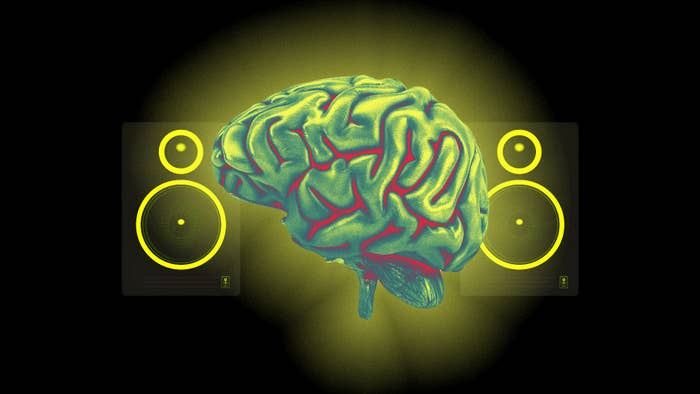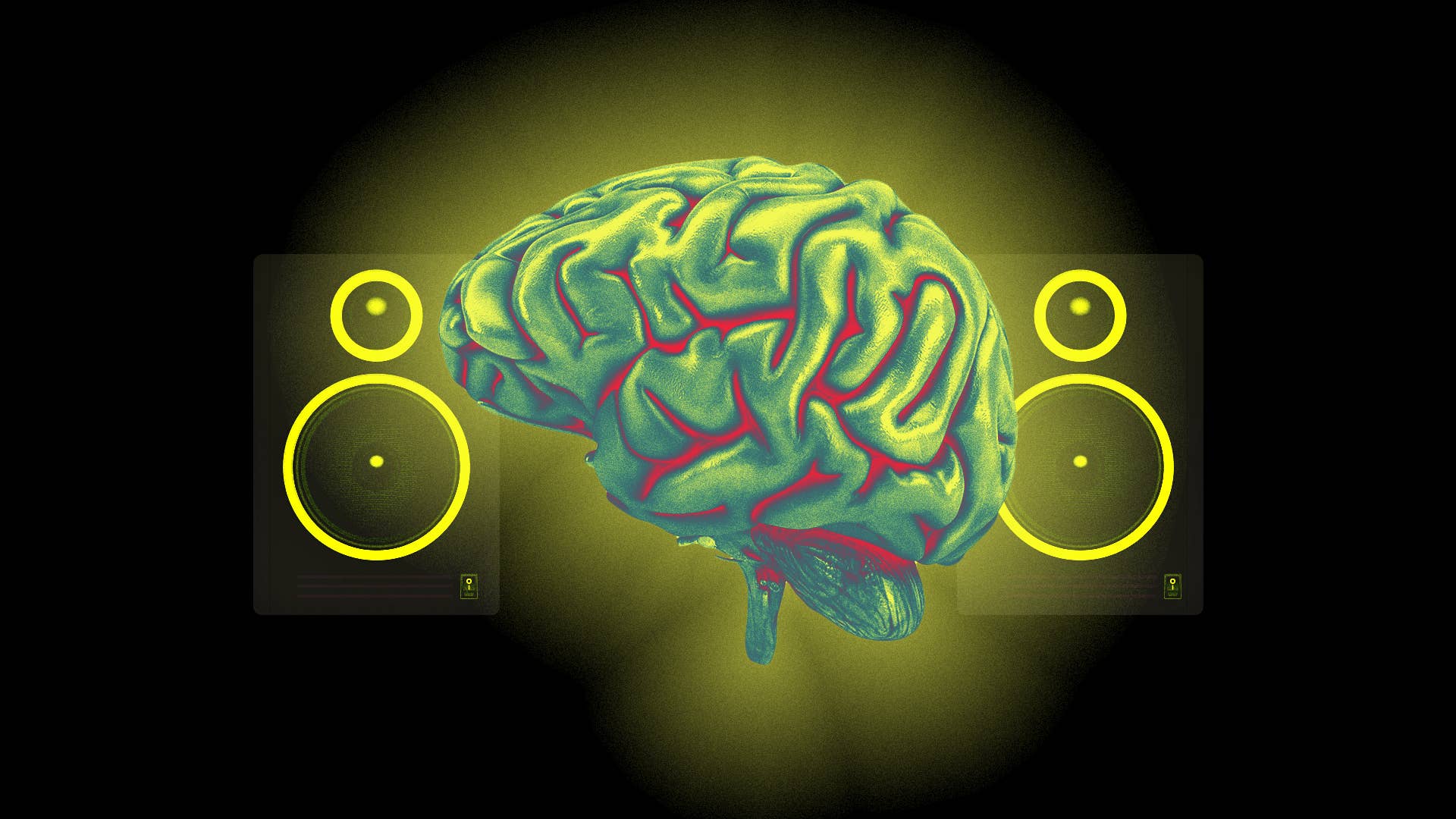
Most people have likely heard someone say this during the course of a music conversation: “I wish I could go back to the first time I heard [insert song].” But does that phrase hold weight? Is there actual scientific evidence behind a first listen to a song being more consequential than subsequent listens, or is it just confirmation bias? According to two experts familiar with how music affects human brains, there is something to the first listen being sweeter—and there’s science behind what kinds of listening experiences make us the most excited.
“Most research suggests there’s a sweet spot here,” says Elizabeth Margulis, director of Princeton University’s Music Cognition Lab. “People tend to like music that is familiar enough that they can form expectations in response to it, but surprising enough that it engages them.
University of San Francisco professor and neuroscientist Indre Viskontas tells Complex that the euphoria we experience from music comes from our brain’s reward system, “which is a complex interplay of genetics and environment and experience.” When our brain feels rewarded, we experience elevated dopamine levels, but in order to have that high from a first listen, we have to understand the structural basics of what we’re listening to in order to know why it’s special.
“As a child, your brain develops the ability to extract meaning from sound,” Viskontas says. “And depending on your experiences as a child, you’ll be better or worse at this.” She explains that a kid who grew up in a busy city environment learns to tune out peripheral sounds such as sirens and horns. But someone in a quieter environment doesn’t have to do that. “When there is sound, they really listen closely, and their brain will learn to extract the sound differently,” she points out. “When they’re listening to a piece of music later on in life, they will hear things that the kid who grew up in a noisy environment might not.”
“Surprising elements drive increased emotional response to music. They seem to snap us out of our listening habits and force us to listen and engage with something new.” – Elizabeth Margulis
Viskontas notes that city kids with a musical background can eventually “rewire” their brain to develop that same acumen as the hypothetical small-town native. Those are two parts of a binary that few people neatly fit, but it is interesting to know that upbringing can determine how much of a song someone initially experiences.
Viskontas says the next element of the equation is familiarity with a genre. People who heavily listen to a genre “start to hear patterns in the music” that they become accustomed to. “In music, one of the things that musicians have mastered is setting up the expectation of the reward,” she explains. “So maybe a song starts out quiet and slow and you’re waiting for the beat to drop. And you know that it’s going to drop and then the more you want it to drop, the more fun it is when it actually drops.”
After we listen to enough of a certain genre or subgenre, we develop structural expectations that inform how our brains process it.
“Response intensity to any particular sound or theme differs according to how familiar people are with the style,” Margulis says. “For example, someone who doesn’t listen to a lot of metal might find a certain passage really loud and aggressive, but someone very familiar with the genre might perceive that same moment as more of a baseline.”
Both experts say that songs with a recognizable structure but innovative flourishes will deliver the most euphoria during a first listen.
“Lots of people argue that surprising elements drive increased emotional response to music,” Margulis says. “They seem to snap us out of our listening habits and force us to listen and engage with something new.”
Viskontas says the human brain “is both designed to encourage us to seek out new things but also to find connections between things. So we can learn about them and understand them and then we feel good.” She explains, “We feel like we understand the world, so when those two things come together in new music, that’s why a first lesson can be really exciting and can give you the sense of euphoria, which is hard to replicate or reproduce.”
She adds that subsequent listens to a song lack the discovery factor to excite our brain’s reward system in the same way. That’s why you may love listening to your faves every day, but you’ve had enough euphoric first listens to know you’ll never get that initial feeling back.
“Response intensity to any particular sound or theme differs according to how familiar people are with the style.” – Elizabeth Margulis
There have been studies about the power of music repetition, where excessive radio play can make songs we’re not impressed with sound pleasurable over time. But what’s the science behind which kind of songs are most likely to enthrall us from the jump?
It’s important to qualify that no matter how good a song is, your brain may not have the best first impression during times of stress or anxiety. If our reward system isn’t in discovery mode, which creates the need for that dopamine high of satisfaction, you might not engage well with a new song. As Viskontas explains, “You kind of have to be in the frame of mind, where you’re OK with that kind of exploration. If your anxiety level or your stress level is already a little bit high, that’s probably not the time to discover a new artist.“
Anticipation and preconceived notions about an artist also play into how you perceive. Viskontas offers the analogy of preparing to eat your favorite dish at your favorite restaurant: “The more you think about it, the more excited you are at the prospect of getting that awesome dish. We can see parts of your brain that get active and where there’s higher levels of dopamine. When you eat that meal you get this big surge of dopamine and another part of the brain that gives you that sense of pleasure.”
Margulis also references a study she was a part of where she was able to examine how listeners’ “brains responded to the same excerpt of music by either telling them it was performed by a world-renowned professional or by a student.” She says that listeners’ “reward circuitry” was more active when they thought a composition was played by a celebrated artist.
Nostalgia also helps build anticipation. The idea that old music is tied to memory isn’t new, but we rarely consider that hearing a certain artist on a new record helps connect them to memories, and therefore informs how we engage with the song.
“Our brain by default is looking for associations and looking for connections,” Viskontas says. “Even just that same sound, their voice or whatever their sound is, can trigger the associations that you already have with that artist, but they can also trigger back to other memories that you have, especially if the artist speaks some truth to you.” In other words, there’s science behind us wanting to write that toxic text while listening to a lovelorn Weeknd or Giveon record. (Try to use that as an excuse if you actually send it.)
With all of this in mind, it makes sense that Drake, one of the most popular artists in the world, had a good chance of satisfying die-hard fans with Scary Hours 2, and a lesser chance of winning over fans who were indifferent about him—especially older rap listeners who don’t care for 808s and subaqueous production. Yes, science shows that there may be something to #realhiphop devotion amongst older fans.
Viskontas notes that our desire to discover new things “decreases with age.” As people get older, she says, “They become more and more stuck in the music that they liked, particularly in their early 20s.” She explains that openness to new things is one of the big five personality traits, and that “we see that over time, people become less adventurous in terms of their musical choices.”
But the first listen isn’t all about our favorites meeting expectations. After all, the reward system is about discovery. Your very first listen to an artist can very well turn you into a lifelong fan.
Instrument choices, tempo, and structure may not deviate too much within certain genres, which breeds the familiarity our brains seek; but hearing a new, distinctive voice could be the element that makes a first listen thrilling. First listens to distinctive artists like Lil Wayne, Future, Lil Uzi Vert, Young Thug, and Kendrick Lamar created many lifelong fans. Not only were their voices intriguing, they were hitting pockets that excited us. They were spitting rewind-worthy lines—but we don’t always get the same euphoria on the playback.
Songs that push beyond the traditional verse-hook-verse format also tend to make us turn our heads. Viskontas notes, “James Taylor once said that music is just tension and release. So you build up the tension, build up the expectation and then you give it a release. And that’s exactly how our reward system in the brain works.”
Cinematic songs like “Dreams And Nightmares,” “Lord Knows,” “First Day Out,” and “Devil In a New Dress,” which consist of buildups, beat switches, and even guitar solos, immediately push us to the edge of our seat.
Viskontas notes, “a big buildup and then a climax, or a guitar or a high voice coming out of other sounds, a key change, [or] a big sort of tamper change like a beat drop, can have this kind of effect on your physiology and your body, giving you the goosebumps.”
Again, the enjoyability of music is tied to a range of factors, and no two people will ever have the same listening experience, but there are elements at play that have a higher chance at compelling us. According to both music experts we spoke with, it’s all about the interplay between familiarity and discovery. We have to have enough familiarity with a genre to know what we’re listening to, but it’s up to the artist to supply the amount of intrigue that will make our first playback unforgettable.

